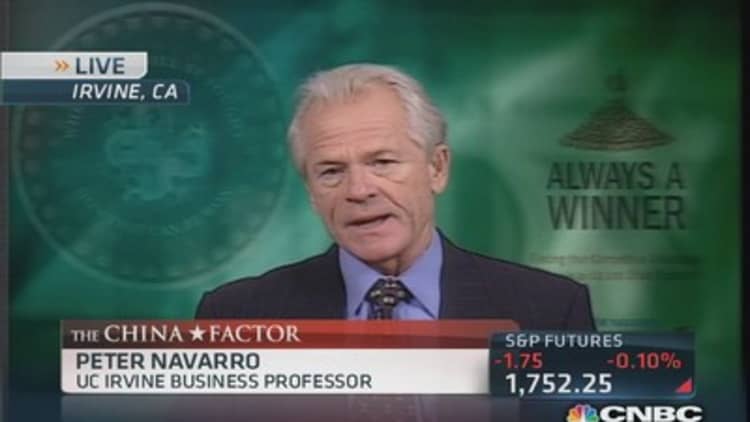China's central bank sought to reassure money market traders that a spike in short-term interest rates does not signal a dramatic tightening of liquidity, sources said, in an apparent move to avoid a repeat of a credit panic that roiled markets in June.
The People's Bank of China also warned against "excessive leverage", or borrowing, that would leave banks overexposed to sudden spikes in demand for cash, said the sources, who attended a closed-door meeting between a PBOC official and traders from major financial institutions late last week.
(Read more: Chinese stocks: Time to take profit?)
China's short-term interest rates began rising sharply last week, leaving banks stretching for funds even as the central bank repeatedly declined to inject fresh cash.
The central bank official reassured traders that liquidity remained ample and the bank would keep its short-term monetary operations - which it uses to steer the country's money supply - stable this year, four sources who attended the meeting said.

The jump in rates came after official data showed startling rises in housing prices and increasing inflationary pressure aggravated by capital inflows, leading some economists to argue that Beijing was preparing to tighten money conditions to suck excess cash out of the system.
The sources, who included both primary dealers and liquidity strategists, said that the official, who is involved in the management of the country's short-term money supply, blamed the rate rise on institutions failing to adequately anticipate the impact upcoming tax payments would have on demand for cash in the interbank market. The official said that actual liquidity conditions were still accommodative.
The sources declined to give the official's name due to the sensitivity of relations with the regulator, and requested anonymity themselves because they were not authorized to speak to the press.
"The message from the PBOC is the same as last time: warning banks against building up too much leverage," said a money dealer at a foreign bank in Shanghai.
(Read more: China leader promises 'unprecedented' reforms)
"But the central bank has been clearer this time around by reassuring the market that if participants do underestimate market conditions, it will come to the rescue."
Change of tune
The end of June saw the People's Bank of China (PBOC) hold off from injecting sufficient cash into money markets to satisfy a routine rise in month-end cash demand. It did so without explanation, resulting in a massive rate spike that saw some rates surge as high as 30 percent as banks scrambled for cash.
Many dealers and economists said the move was intended as a shot across the bows of banks that had overindulged in shadow banking activities, but the squeeze caused a brief panic in other financial markets as equity investors bailed out of Chinese stocks in fear a wider tightening cycle was under way.
It also startled investors overseas, who worried that China had suddenly made an abrupt monetary policy shift.
The People's Bank of China (PBOC) subsequently came under public criticism for its opaque management of the affair, and promised to improve communication with the market.
However, traders said that the bank's management of the market remained opaque in the aftermath of the crunch, and that it had, in fact, tightened its control of rates using intermediary banks.
Investors grew nervous once again as October drew to a close, and yet the PBOC once again quietly refrained from injecting funds, abstaining from injecting cash through regularly scheduled open market operations three times in a row.
As a result, the most commonly traded instruments jumped, with the benchmark seven-day bond repurchase contract quoted at nearly 7 percent on October 24, its highest level since June.
(Read more: Earnings growth slow at China's number two bank)
Asian shares fell in response on Thursday as investors feared tighter monetary conditions could weigh on China's economic growth.
However, rates never approached the stratospheric levels of the June crunch, and the PBOC finally broke its fast on Tuesday morning, injecting 13 billion yuan ($2.14 billion) into the market.
The amount was relatively small, and the PBOC also reissued a portion of maturing bills on Monday - because such bills would have otherwise injected more cash when they matured, the reissuance showed regulators continue to keep a tight grip on the market.
But the injection, when combined with the effect of the meeting, appears to have soothed nerves, with rates remaining elevated but stable by market close on Tuesday. The seven-day repo was quoted at 5.03 percent by market close.
"The PBOC has apparently strengthened efforts to let the market understand what is going on the macroeconomic front so as to avoid a repetition of June's market squeeze," said a dealer at a Chinese commercial bank in Shanghai.
(Read more: Why the huge write-off by China banks is positive)
"Its explanations last week were very clear and detailed. Combined with its cash injection on Tuesday, they have served to stabilize market sentiment as well as money rates."
The official added that the PBOC would conduct open market operations with an eye on liquidity conditions both at home and overseas, in particular on pressure applied to the monetary system from capital inflows from abroad, the sources said.
Official data showed the PBOC intervened strongly in the foreign exchange market in the third quarter to hold back a rally in the yuan's exchange rate, but a side effect of such interventions was the release of new yuan into the interbank market, adding to net liquidity.

